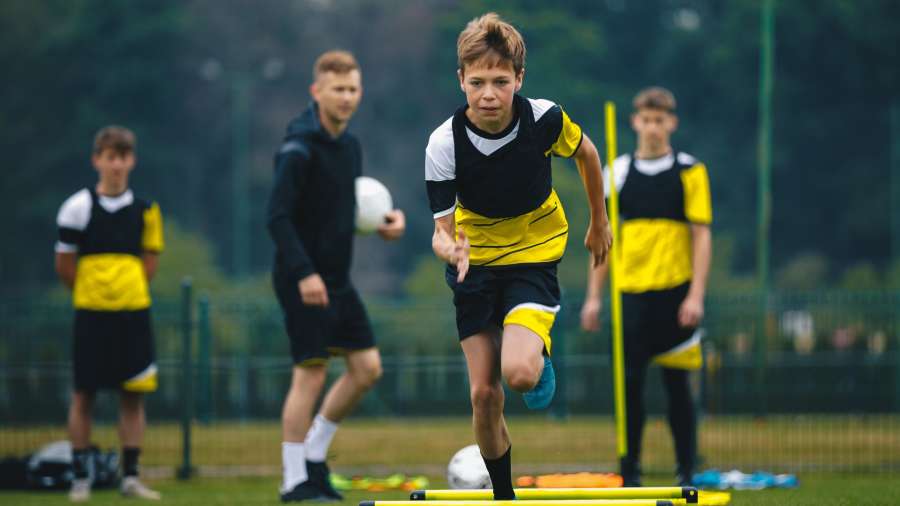How to improve your acceleration and top speed?

Speed matters. Football (soccer) teams with faster players have higher chances of winning. In this article we’ll share the latest sport scientific insights on running speed. We’ll share benchmark data for acceleration and top speed. And provide you with strategies how to improve your speed.
The sport science behind sprint speed
Why is Mbappé so fast? Looking at speed for football players from a sport scientific perspective, we can breakdown the answer as follows:
fast in short sprints (5 - 30 meters)
strong acceleration from 0 to 10 meters
high top speed between 20-40 meters
So Mbappé is faster than other players because he can do multiple short sprints during a match, has strong acceleration and a high top speed.
Why is sprint speed important?
Sport science has found that most goals and decisive actions in football are preceded by accelerations and sprints.
Match analysis shows that sprints in football average around 20m for all playing positions for male football players. However, the most common covered sprinting distance for each gender is < 10m. For short sprinting distances your acceleration capacity is very important.
Comparing your acceleration and top speed
You probably won’t run as fast as Mbappé. But what is a good sprint speed for you? Nikolaidas et al.3, have created some reference data for male football players that could serve as a guideline for you.
Unfortunately, we couldn’t find any reference data for female football players in the literature. Mingle Sport is working on a benchmark for all ages / genders / playing positions in grassroots football.
Table 1: Benchmarks for 10m Sprint Speed* (acceleration)
| Poor | Fair | Below average | Above average | Good | Excellent | |
|---|---|---|---|---|---|---|
U12 | ≤ 13.4 | 13.5 – 15.1 | 15.2 - 16.5 | 16.6 - 17.1 | 17.2 – 17.6 | ≥ 17.7 |
U14 | ≤ 14.1 | 14.2 - 16.6 | 16.7 – 17.9 | 18.0 – 18.5 | 18.6 – 19.3 | ≥ 19.4 |
U16 | ≤ 15.2 | 15.3 – 16.0 | 16.1 – 18.6 | 18.7 – 19.8 | 19.9 – 20.2 | ≥ 20.3 |
U18 | ≤ 16.0 | 16.1 – 18.1 | 18.2 – 19.4 | 19.5 – 20.1 | 20.2 – 20.8 | ≥ 20.9 |
U20 | ≤ 15.7 | 15.8 – 18.1 | 18.2 – 20.1 | 20.2 – 20.5 | 20.6 – 20.7 | ≥ 20.8 |
U25 | ≤ 16.1 | 16.2 – 16.6 | 16.7 – 19.7 | 19.8 – 20.6 | 20.7 – 21.2 | ≥ 21.3 |
U30 | ≤ 16.3 | 16.4 – 18.7 | 18.8 – 19.3 | 19.9 – 20.0 | 20.1 – 20.7 | ≥ 20.8 |
Reference values taken and adapted from Nikolaidas et al.
Table 2: Benchmarks for 20m Sprint Speed*
| Poor | Fair | Below average | Above average | Good | Excellent | |
|---|---|---|---|---|---|---|
U12 | ≤ 16.2 | 16.3 - 17.1 | 17.2 - 18.5 | 18.6 - 19.3 | 19.4 - 20.1 | ≥ 20.2 |
U14 | ≤ 18.3 | 18.4 - 19.4 | 19.5 - 20.6 | 20.7 - 21.6 | 21.7 - 22.5 | ≥ 22.6 |
U16 | ≤ 19.1 | 19.2 - 19.8 | 19.9 - 21.6 | 21.7 - 22.9 | 23.0 - 23.6 | ≥ 23.7 |
U18 | ≤ 20.1 | 20.2 - 21.1 | 21.2 - 22.4 | 22.5 - 23.6 | 23.7 - 23.9 | ≥ 23.8 |
U20 | ≤ 20.6 | 20.6 - 21.8 | 21.9 - 23.2 | 23.3 - 23.8 | 23.8 - 24.2 | ≥ 24.3 |
U25 | ≤ 20.2 | 20.3 - 20.9 | 21.0 - 23.2 | 23.3 - 23.7 | 23.7 - 24.3 | ≥ 24.4 |
U30 | ≤ 19.8 | 19.9 - 20.6 | 20.7 - 22.4 | 22.5 - 23.4 | 23.4 - 24.2 | ≥ 24.3 |
Reference values taken and adapted from Nikolaidas et al.
How to improve your football (soccer) acceleration and top speed
Running faster in football games requires you to improve different aspects of your ability to repeatedly run faster.
Improve muscle strength (through strength training or plyometrics)
Improve on your running technique
Work on your repeated sprint ability so you can run faster more often
Next up in this series in How to measure your sprint speed for football. And 5 training tips to improve your speed.
Literature
Faude O., Koch, T., and Meyer, T (2012). Straight sprinting is the most frequent action in goal situations in professional football*. J Sports Sci 30: 625–63*.
Oliva-Lozano, J., Fortes, V., Krustrup P., and Muyor, M. J. (2020). Acceleration and sprint profiles of professional male football players in relation to playing position. PLoS one, 15(8), e0236959.
Gualitieri, A., Rampinini, E., Lacono, D. A., and Beato, M. (2023). High-speed running and sprinting in professional adult soccer: Current thresholds definition, match demands and training strategies. A systematic review. *Frontiers in Sports and Active Living 5, 1116293.*3389/fspor.2023.1116293
Nikolaidas, P. T., Knechtle, B., Clemente, F., and Torres-Luque, G. (2016). Reference values for the sprint performance in male football players aged from 9-35 years.
Biomedical Human Kinetics, 8, 103-112 . DOI: 10.1515/bhk-2016-0015


